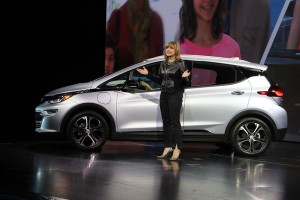
A battery-car like the Chevy Bolt - shown here with GM CEO Mary Barra - could recharge in 5 to 8 minutes, StoreDot claims.
Sales of plug-in hybrids and pure battery-electric vehicles declined last year, despite the steady roll-out of new models. Advocates tend to blame cheap gas, but three other factors have helped steer potential shoppers away from battery vehicles: high cost, limited range and long charging times.
Tesla, General Motors and several other manufacturers hope to address the first two challenges with products like the Tesla Model 3 and Chevrolet Bolt, both offering up to 200 miles range at base prices of $35,000 or less. Now, a small Israeli start-up hopes to solve the third big problem, lengthy charge times.
“Our target is to charge electric vehicles in five minutes,” said Erez Lorber a senior vice president with StoreDot, an Israeli start-up based in the Tel Aviv suburb of Herzliya.
Founded in 2013, and backed by a series of investors that includes tech giant Samsung, StoreDot is working on a modified version of today’s lithium-ion technology that could benefit both automotive and consumer electronics applications.
StoreDot isn’t the only company trying to address charging times that can run to 12 hours or more for many electric vehicles today. Tesla is setting up a network of so-called Superchargers across the U.S. and in several other countries, and it contends it can give a vehicle like the Model S P80D an 80% “fill up” in less than 30 minutes or so.
(EV industry expected to hit nearly $60 billion by 2021. For more, Click Here.)
That’s simply not give enough to satisfy mainstream buyers like those the auto industries wants to attract, however, suggested Lorber, during a meeting in Tel Aviv. “You need to recharge in less than eight minutes, which is around what it typically takes to refuel.”
Longer charging times, even at 15 to 30 minutes, mean significant disruptions during travel, experts agree. And it can result in long waits to access Tesla superchargers and similar, so-called Level III chargers popping up around the U.S. and Europe for owners of other brand battery cars.
Today’s quick chargers present other problems. Operating at 440 volts and extremely high amperage they generate significant heat within a battery that can degrade long-term life. That’s why some manufacturers are reluctant to allow the use of Level III chargers, resulting in even longer charging times.
Lorber contends that the StoreDot chemistry generates far less internal heat than conventional lithium-ion batteries “because there is lower internal resistance.” That also reduces the threat of a battery fire. Though that has not been a major issue with automotive batteries, a number of airlines have restricted shipment of lithium-ion technology because of fire risks.
(Click Here for details about the 17 fuel cell models hitting the market in the next decade.)
StoreDot isn’t disclosing much about the design of its new batteries beyond hinting that it uses “nano crystal bio-organic technology.” The basic chemistry appears to undergo some modification. So do the cathode and anode portions of the company’s batteries, something that other battery start-ups are addressing, as well.
According to Lorber, StoreDot’s batteries could be produced using most existing battery manufacturing systems, which would be a boon to companies like Samsung. A major exception would be Tesla, which is just launching production at its new Gigafactory in Reno, Nevada.
The StoreDot batteries use what’s known in the business as a pouch “form factor” that can be tailored to fit into a variety of different devices, including cars and consumer electronics. Tesla, however, relies on batteries shaped much like an old-fashioned D-cell.
Battery prices have been dropping rapidly as more automakers enter the electric arena. According to Lorber, “Our costs will be slightly higher, but still in the $150 to $200 (per kilowatt-hour) range, which is still competitive.” GM claims to be paying around $150 per kWh for the new Chevy Bolt’s batteries.
StoreDot still has some challenges to overcome, including matching the life of current lithium-ion batteries, but it believes it is close to resolving that issue and hopes to have fully functioning prototypes ready later this year, with commercialization possible by sometime in 2017.
(Honda will offer battery version of the new Clarity, too. Click Here for the story.)
The company has so far raised $66 million to move forward with the project and expects to license the technology, rather than go into battery manufacturing on its own.


It’s just around the corner………….
At first blush, a battery system that does what this one is said to do either is game-changing news or a 21st Century version of the 100-mpg carburetor. I’d like to know more about the total funding and the “series of investors that includes tech giant Samsung”.